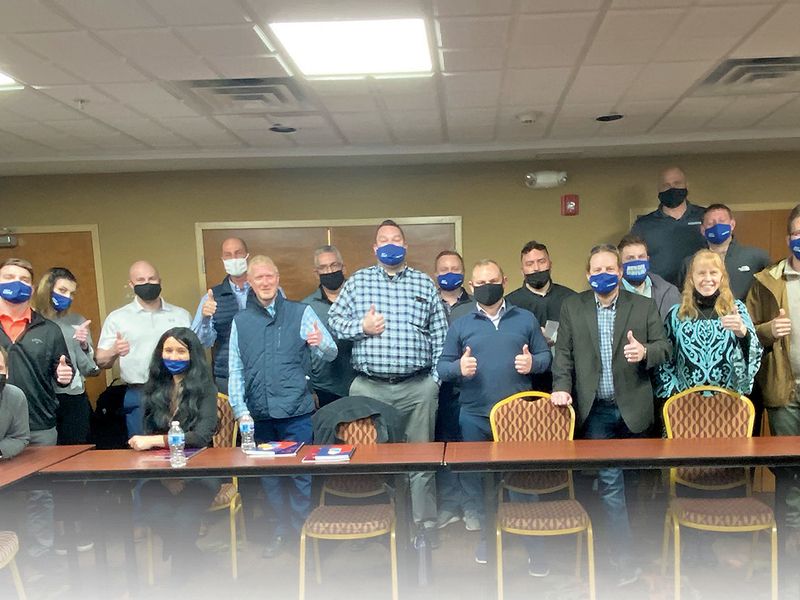
As dealerships accelerated digital retailing during the pandemic, giving customers the ability to conduct entire transactions electronically, David O’Brien saw a critical element of the sales process rapidly slipping away: the human interaction that builds relationships.
O’Brien, who has worked in various roles in dealership training for more than 20 years, saw another flaw in a system he helped perpetuate. People like him fly into a city, spend two or three days giving intensive training to service advisers, and then they leave. Soon after, the training often comes to a halt, and what was learned may soon be forgotten.
Those observations led O’Brien to co-found Quantum5, a training company based in Scottsdale, Ariz. It uses artificial intelligence and other technology — as well as person-to-person training — to help teach traditional sales skills, such as recognizing the needs and desires of customers to find what motivates them to buy products and services.
Quantum5 offers training in person or via Zoom and follows up by giving service advisers an app they can access through a phone or computer at any time to review and strengthen what they’ve learned.
The content on the app is delivered in bite-size pieces — “snackables” in Quantum5 parlance — that can be digested in a minute or two. O’Brien says that is how some advisers prefer to learn because they are often pressed for time.
“Think of how peoples’ patience is now,” he says. “Nobody wants to sit for 20 or 30 minutes and stare at a screen, so we broke all of our content into snackable content. Then we used [online] game content professionals to turn it into questions, answers and games where you can earn points for [incentives] we know you care about.”
Through the app, advisers can take quizzes, listen to audio clips and act out scenarios with customers in video clips.
Brian Kramer, general manager of Germain Toyota of Naples, Fla., part of Germain Automotive Group based in Columbus, Ohio, had his sales staff take the Quantum5 training. His service advisers will take the training in the second quarter.
Kramer says the sales staff, especially those who are younger, like the ongoing lessons on the app.
“They think it’s the best thing ever because it doesn’t take hours,” he says. “They can do it in 15 minutes, which is about how long their attention span is. They do it at home, at odd hours, in their free time; they can jump into it at any time.”
Though customers have embraced the ease of booking service appointments online, communicating by text and even paying remotely, many still want to talk to someone, O’Brien says, so the training focuses on connecting with customers.
“People kept calling dealerships,” he says. “Even though they liked that technology was making it easier, they still picked up the phone, and said, ‘I’m on your website, and I’m doing this and this, but I have a couple of questions.’ ”
That is an opportunity to figure out what pushes the right buttons with the customer, and to use that information to start building a relationship, he says.
Instead of reading from a menu or reciting a script, O’Brien wants service advisers to listen to what customers are saying and look for cues that will place customers into one of four social styles:
1. A “driver” is in a hurry and wants the bottom line.
2. An “analytical” wants more detail and time to mull it over.
3. An “amiable” likes to build relationships but has trouble deciding.
4. An “expressive” likes to express feelings and is an impulsive decision-maker.
O’Brien, whose father was a car dealer, started selling vehicles at a Chevrolet dealership in downtown Chicago in 1981 and recalls salespeople then were schooled in the basic skills of talking with people to learn their motivations. As more communication became digital, those skills have steadily eroded, he says.
“The last 20 years we’ve concentrated on [customer relationship management], how to write email templates, how to respond to a customer quickly and give them all the information,” he says. “We stopped working on the basic [sales] skills a long time ago as technology got between us and our customer.
“They don’t talk to people about their needs or motivations. They talk to them about deal facts.”
Donley Automotive Group, which has four Ford stores in central Ohio, including two with Lincoln franchises, had service advisers go through in-person training with Quantum5 in early March.
Fixed Operations Director Joel Tanner says Quantum5 monitors how often his service advisers use the app and how quickly they are advancing. This removes that burden from him and other managers who were often tasked with prodding employees to keep using what they recently learned.
“With typical training, you literally had to become a subject matter expert on whatever they were teaching that day or week, and then you are required to do the follow-up and make sure your team members are embracing the new training,” Tanner says. “Sadly, you spent a boatload of money on it, and weeks or months later, it’s by the wayside because we’re so busy in this industry that it’s impossible for us to also be the trainers.”
Tanner also liked that Quantum5 doesn’t teach new processes or make advisers memorize new sales pitches. Instead, advisers are taught to pick up cues from body language, emails and texts to help form their plan.
“With typical training, they’re trying to ‘load your lips’ with a lot of word tracks and how to deal with objections,” he says. “Those things are good to a point, but when you pick up on the social cue from the person, you don’t need a word track. It’s a lot easier to just think on your feet than memorizing one thing for this objection and memorizing something else for a closing.”